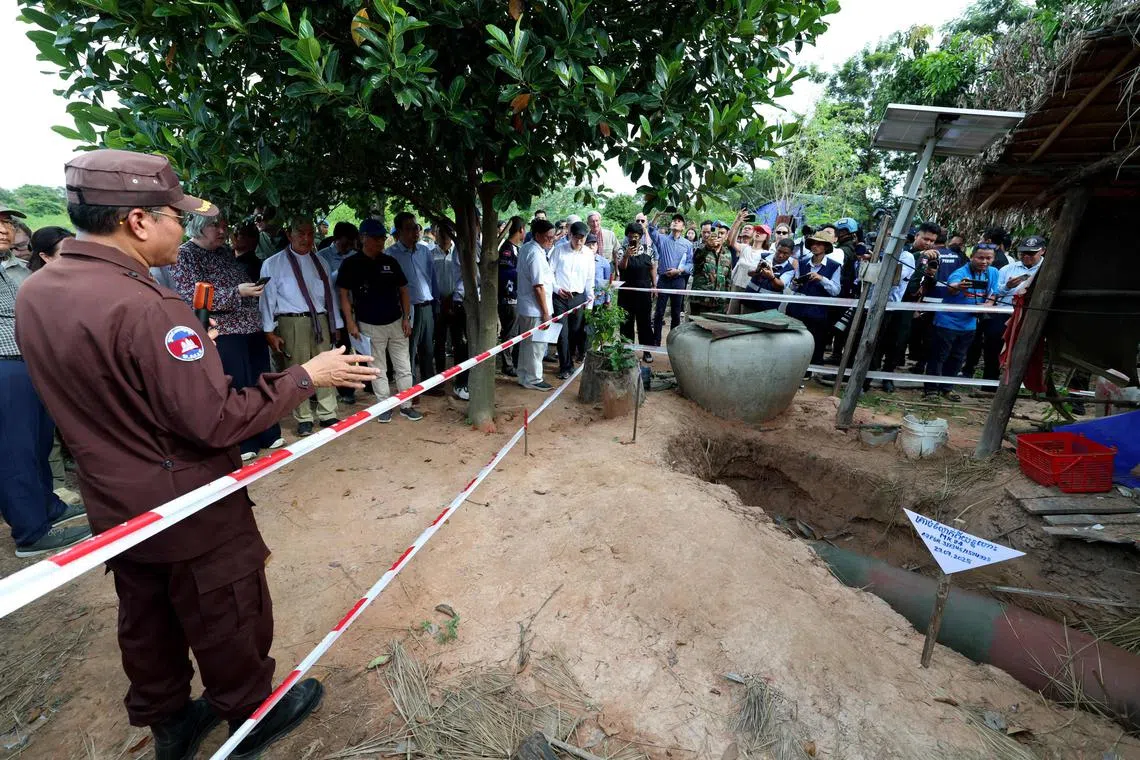Cambodia and Thailand agree on weapons withdrawal to ease tensions
Sign up now: Get insights on Asia's fast-moving developments

An Aug 22 photo showing a bomb dropped by the Thai military during the July border clashes between Cambodia and Thailand.
PHOTO: AFP
BANGKOK – Cambodia and Thailand have agreed to gradually withdraw heavy weapons from their disputed border and cooperate on landmine clearance, key steps towards de-escalating tensions after violent clashes in July killed dozens.
The measures – aimed at bringing peace and stability to their roughly 800km contested frontier – were agreed at a special session of the General Border Committee on Sept 10. The panel is one of the mechanisms set up by the two countries to resolve security issues.
The South-east Asian neighbours have continued to station troops and weaponry along the border, more than six weeks after agreeing to a ceasefire brokered by US President Donald Trump.
Five days of intense fighting between Thai and Cambodian forces in July, involving fighter jets, missiles and heavy artillery, killed more than 40 people and displaced hundreds of thousands from border areas in both countries.
Defence officials will finalise an implementation plan for moving heavy artillery and destructive weapons and equipment back to their normal military installations in three weeks, Thai Deputy Defence Minister Nattaphon Narkphanit said at a briefing on Sept 10.
They will also set up a panel to coordinate landmine clearance along the border within a month, he added.
The removal of heavy and destructive weapons will help urgently de-escalate tensions, Cambodian Defence Minister Tea Seiha said.
Landmines have played a major role in the souring of ties between the two countries. A series of explosions in July injured several Thai soldiers, prompting Thailand to recall its envoy from Phnom Penh and expel the Cambodian ambassador. Fighting broke out a day later.
The two countries also agreed to prepare a joint action plan to suppress scam centres, with Thailand having provided coordinates of more than 60 such venues in Cambodia for decisive action, Mr Nattaphon said.
New Thai Prime Minister Anutin Charnvirakul has listed restoring peace with Cambodia as a priority, while protecting the country’s sovereignty. He succeeded Ms Paetongtarn Shinawatra, who was removed as prime minister in August for ethical violations over her handling of the border dispute.
The two sides also agreed to consider reopening some border crossings to facilitate trade and mitigate the impact on businesses and transport, according to a joint statement.
The Thai-Cambodia conflict traces its roots to longstanding tensions over colonial-era maps and treaties that defined their shared border. Relations had remained relatively stable after 2011 clashes that left dozens dead, before erupting again into five days of intense fighting in 2025. Bloomberg


